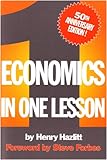http://www.amazon.com/Economics-One-Lesson-50th-Anniversary/...
Here's a link to one chapter on rent control, with detailed examples (saw this here at HN before reading the book):
http://jim.com/econ/chap18p1.html
Here's part of the reason people won't honestly evaluate the pros and cons of economic arguments:
http://www.overcomingbias.com/2007/03/blue_or_green_o.html http://www.overcomingbias.com/2007/02/politics_is_the.html
Finally, economics is complicated, but we've got almost all of human history to give us some data. It's got an immense amount of noise in it, but general trends do emerge. Price controls far below market have always created a black market, even in a hardcore enforced police state. That's a fact. Maximum price of goods under what people want to pay... human behavior... black market. That example is clear enough, and not many places in the world today are trying that one. Likewise, we're constantly trending to better economic systems with some blips here and there along the way. Many of the ideas we're arguing about today will be settled, and many of the positions held today will look really foolish in the near future. That's part of being human and progress in thought.


There's an old 1948/52? edition available as a scanned PDF which can give you an idea if you want to buy the updated version: http://www.fee.org/pdf/books/Economics_in_one_lesson.pdf.
At a higher level, The Road to Serfdom by Friedrich von Hayek is also short but unlike the above quite dense. Most useful (to me) for applying information theory to command economies. Rather apropos to the situation in the US today, it was published in 1944 and dedicated to "The socialists of all parties". It was intended as a warning to the British socialists of the day who were about to take over and remake their country, warning them of a variety of things, some of which they found out the hard way, plus the demonstrable even back then danger of concentrating so much power at the top (too easy for idiot thugs to take over, e.g. Stalin, "Those who are good at acquiring and exercising discretionary powers in government are usually the most ruthless and corrupt individuals." (Wikipedia)). http://www.amazon.com/Road-Serfdom-Fiftieth-Anniversary/dp/0...
Check out http://en.wikipedia.org/wiki/The_Road_to_Serfdom#External_li... for the Reader's Digest condensed version (Hayek was amazed at how good it was) and there's even a cartoon version that I reviewed and found to be quite good.
After the above two you'll be oriented for a variety of much larger tomes, from the classic The Wealth of Nations to e.g. von Mesis' Human Action.